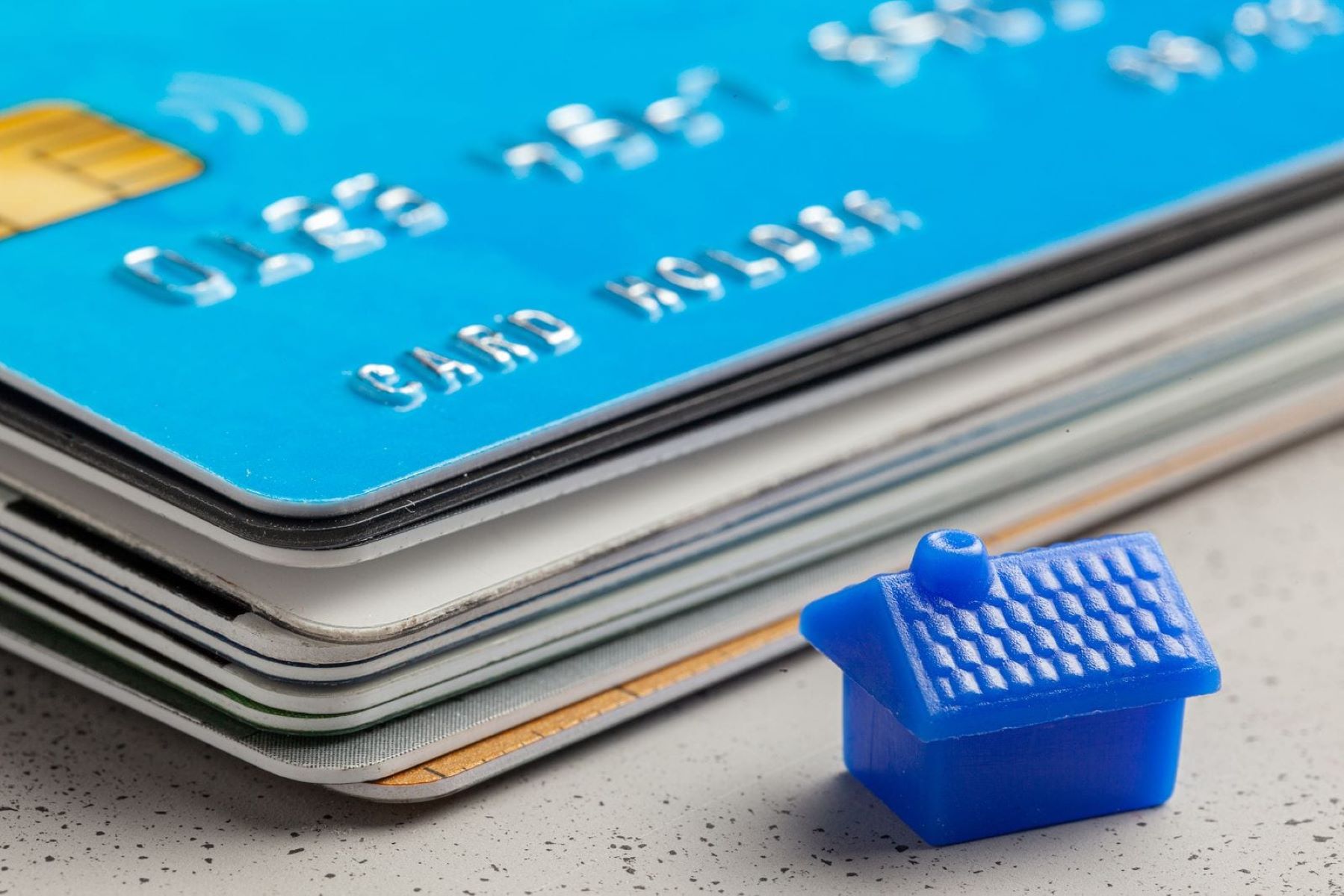

Finance
How To Prepare Your Credit To Buy A House
Modified: March 10, 2024
Learn how to improve your credit score and prepare your finances for buying a house with these helpful tips and strategies in our comprehensive guide on finance and homeownership.
(Many of the links in this article redirect to a specific reviewed product. Your purchase of these products through affiliate links helps to generate commission for LiveWell, at no extra cost. Learn more)
Table of Contents
- Introduction:
- Understanding Your Credit Score:
- Checking Your Credit Report:
- Correcting Errors on Your Credit Report:
- Paying off Debts and Managing Credit Utilization:
- Avoiding Late Payments:
- Building a Strong Credit History:
- Avoiding Opening New Credit Accounts:
- Minimizing Credit Inquiries:
- Lowering Your Credit Card Balances:
- Using Credit Wisely:
- Managing Your Finances Responsibly:
- Conclusion:
Introduction:
Buying a house is one of the most significant financial decisions that many people make in their lifetime. It’s a dream that requires careful planning, especially when it comes to your credit. Your credit score and credit history play a crucial role in determining your eligibility for a mortgage loan and the interest rate you will receive.
In this article, we will discuss essential steps to prepare your credit before buying a house. We will explore strategies to improve your credit score and establish a solid credit foundation that will enhance your chances of securing a favorable mortgage loan.
Understanding the key factors that influence your credit score is paramount. Lenders evaluate your creditworthiness based on several factors, including your payment history, credit utilization, length of credit history, credit mix, and new credit. A higher credit score indicates to lenders that you are a responsible borrower and are more likely to make timely mortgage payments. With this in mind, let’s dive into the steps you can take to prepare your credit for buying a house.
Understanding Your Credit Score:
Before you begin the process of preparing your credit for buying a house, it’s important to have a clear understanding of your credit score and how it reflects your financial health.
A credit score is a numerical representation of your creditworthiness, ranging from 300 to 850. The higher your credit score, the more favorable loan terms you are likely to receive. Credit scores are commonly classified into the following ranges:
- Poor (300-579)
- Fair (580-669)
- Good (670-739)
- Very Good (740-799)
- Excellent (800-850)
Lenders use credit scores as a quick way to assess the risk of granting you a loan. They consider factors such as your payment history, the amounts owed, length of credit history, credit mix, and new credit applications. It’s important to note that different lenders may have their own criteria for evaluating credit scores.
To check your credit score, you can use free online tools or contact your credit card issuer. Additionally, you can request a free credit report from each of the three major credit bureaus (Experian, Equifax, and TransUnion) once a year via www.annualcreditreport.com.
By understanding your credit score, you can gauge where you stand in terms of creditworthiness and identify areas for improvement. This knowledge will empower you to take the necessary steps to strengthen your credit profile in preparation for buying a house.
Checking Your Credit Report:
Once you have a clear understanding of your credit score, it’s essential to review your credit report for accuracy and potential errors. Your credit report contains detailed information about your credit history, including your accounts, payment history, and any negative marks such as late payments or collections.
Checking your credit report regularly allows you to identify any inaccuracies or discrepancies that may be negatively impacting your credit score. These errors could be due to reporting mistakes by creditors or identity theft.
To obtain your free credit report, visit www.annualcreditreport.com, which is the only official website authorized by the Federal Trade Commission. You can request a report from each of the three major credit bureaus once a year.
Review your credit report carefully, checking for the following information:
- Incorrect personal information (name, address, etc.)
- Accounts that are not yours
- Missed or late payments that you believe are incorrect
- Debts that have been paid off but are still showing as outstanding
- Collections or judgments that you do not recognize
If you find any errors or discrepancies, you have the right to dispute them with the credit bureau. Contact the bureau in writing, providing any evidence or documentation to support your claim. The credit bureau is legally obligated to investigate and correct any inaccuracies within 30 days.
Regularly checking your credit report and promptly resolving any errors will help ensure that your credit history is accurately reflected, giving you a better chance of securing favorable loan terms when you’re ready to buy a house.
Correcting Errors on Your Credit Report:
If you discover any errors or discrepancies on your credit report, it’s important to take immediate action to correct them. Inaccurate information can have a significant impact on your credit score and potentially hinder your ability to secure a favorable mortgage loan.
Follow these steps to dispute and correct errors on your credit report:
- Document the errors: Make a list of the errors you have identified on your credit report. Include any supporting documentation, such as payment receipts or account statements, to strengthen your case.
- Dispute the errors: Submit a written dispute to the credit bureau(s) that issued the erroneous report. Clearly explain the errors and provide any evidence you have gathered. You can usually dispute errors online or by mail.
- Notify the furnisher: If the error is related to a specific creditor or lender, notify them in writing as well. Provide copies of the documents you submitted to the credit bureau(s) as evidence.
- Follow up: The credit bureau has 30 days to investigate your dispute and respond. If they find the information to be inaccurate, they are legally obligated to correct it on your credit report. Monitor your credit report after the dispute to ensure the corrections have been made.
Correcting errors on your credit report can take time and patience, but it is essential to ensure your credit history is free of inaccuracies. A clean and accurate credit report will improve your creditworthiness, making it easier to obtain a mortgage loan with favorable terms and interest rates.
Remember to regularly check your credit report to catch any new errors that may appear. By staying vigilant and proactive, you can maintain a clean credit history and increase your chances of a successful home buying experience.
Paying off Debts and Managing Credit Utilization:
One crucial step in preparing your credit for buying a house is to pay off outstanding debts and effectively manage your credit utilization. Lenders closely examine your debt-to-income ratio and credit utilization rate to evaluate your ability to handle additional financial responsibilities.
Here are some strategies to help you pay off debts and manage your credit utilization:
- Create a budget: Assess your income and expenses to determine how much you can allocate toward debt repayment. Prioritize high-interest debts and consider consolidating them into a single, more manageable payment.
- Pay more than the minimum: Aim to pay more than the minimum monthly payment on your debts. By paying extra, you can reduce the principal amount and pay off the debt faster, saving money on interest payments.
- Focus on high-interest debts: If you have multiple debts, prioritize those with higher interest rates. By paying off high-interest debts first, you can save money in the long run and reduce your overall debt burden.
- Avoid new debt: While you’re preparing to buy a house, it’s essential to avoid taking on new debt. Limit your credit card usage and resist the temptation to make large purchases on credit.
- Keep credit card balances low: Credit utilization, the ratio of your credit card balances to their limits, plays a significant role in your credit score. Aim to keep your credit utilization rate below 30% to demonstrate responsible credit management.
- Pay on time: Consistently making timely payments is a crucial factor in improving your creditworthiness. Late payments can have a significant negative impact on your credit score. Set up automatic payment reminders or consider using payment apps to ensure you never miss a due date.
By paying off debts and effectively managing your credit utilization, you can demonstrate to lenders your ability to responsibly handle credit. This will strengthen your credit profile and increase your chances of obtaining a mortgage loan with favorable terms.
Avoiding Late Payments:
One of the most critical factors in maintaining a healthy credit profile is avoiding late payments. Late payments can have a significant negative impact on your credit score and may hinder your ability to secure a mortgage loan with favorable terms. Therefore, it’s vital to prioritize making payments on time to demonstrate financial responsibility.
Here are some strategies to help you avoid late payments:
- Create a payment calendar: Keep track of all your upcoming bills and their due dates. Use a physical or digital calendar to mark the due dates and set reminders to ensure you make payments on time.
- Set up automatic payments: Whenever possible, enroll in automatic payment plans offered by your lenders. This way, the payment will be deducted directly from your bank account on the scheduled due date, eliminating the risk of forgetting or making a late payment.
- Adjust due dates: If timing is an issue and your lenders offer the flexibility to choose a due date, consider adjusting the due dates to coincide with your paydays. This way, you’ll have enough funds available to make the payments on time.
- Utilize reminders and notifications: Take advantage of technology by setting up reminders and notifications on your phone or email to alert you about upcoming due dates. Many banking apps also offer payment reminders to help you stay on top of your bills.
- Opt for electronic statements and payments: Receive electronic statements and make payments online whenever possible. This reduces the chances of delays caused by postal delivery or processing times.
- Communicate with your lenders: If you’re facing financial difficulties and anticipate being unable to make a payment on time, communicate with your lenders proactively. They may be willing to work out a new payment plan or arrange a temporary alternative to ensure you avoid late payment penalties.
By consistently making payments on time, you demonstrate your ability to manage your financial obligations effectively. This responsible behavior will have a positive impact on your credit history and increase your chances of securing a mortgage loan with favorable terms when purchasing a house.
Building a Strong Credit History:
Building a strong credit history is an essential component of preparing your credit for buying a house. A solid credit history demonstrates your ability to manage credit responsibly and increases your creditworthiness in the eyes of lenders. Here are some strategies to help you build a strong credit history:
- Open credit accounts: If you have limited credit history, consider opening a credit card or a small personal loan. These accounts will provide an opportunity to establish a positive payment history and show lenders that you can responsibly handle credit.
- Make timely payments: Consistently making payments on time is crucial for building a strong credit history. Set reminders, automate payments, and prioritize meeting payment deadlines to demonstrate your reliability to creditors.
- Maintain low credit utilization: Keep your credit card balances low compared to their limits. Aim to keep your credit utilization rate below 30% to show lenders that you can effectively manage and control your credit utilization.
- Keep accounts active: Accounts with a longer history can positively impact your credit score. Avoid closing accounts unnecessarily, as they contribute to the length of your credit history. If you have unused credit cards, consider making occasional small purchases and promptly paying them off to keep the account active.
- Diversify your credit mix: Having a mix of different types of credit can enhance your credit history. This might include credit cards, auto loans, student loans, or a mortgage. However, it’s important not to take on too much debt solely for the sake of diversification.
- Consider becoming an authorized user: If someone you trust and has good credit is willing to add you as an authorized user on their credit card account, it can help build your credit history. Ensure that their responsible credit behavior will be reported on your credit report.
Building a strong credit history takes time and requires consistent responsible credit behavior. By focusing on timely payments, low credit utilization, and a diverse credit mix, you can establish a solid credit foundation that will benefit you when applying for a mortgage loan to purchase your dream house.
Avoiding Opening New Credit Accounts:
When preparing your credit for buying a house, it’s important to avoid opening new credit accounts unless absolutely necessary. While opening new credit accounts can provide an initial increase to your available credit, it can also have potential negative consequences on your credit profile.
Here are a few reasons to avoid opening new credit accounts:
- Impact on credit score: Opening new credit accounts can temporarily lower your credit score. It can result in an inquiry on your credit report, which may cause a slight decrease in your score. Additionally, having multiple new accounts in a short period can signal to lenders that you may be seeking excessive credit.
- Increased debt potential: Opening new credit accounts can tempt you to accumulate more debt. Your debt-to-income ratio is an essential factor that lenders consider when evaluating your mortgage application. Increasing your debt potential can raise concerns about your ability to manage additional financial responsibilities.
- Credit history length: Opening new credit accounts can shorten your average credit history length. A longer credit history is generally favorable and can positively impact your credit score. Therefore, if you have established credit accounts with a good payment history, it’s best to keep them open to maintain a longer credit history.
- Delayed plans: Opening new credit accounts can delay your plans of buying a house. Each time you apply for credit, it triggers a hard inquiry on your credit report, which remains visible for two years. Too many inquiries in a short period can be seen as risky behavior by lenders.
While it’s important to have a healthy credit mix and demonstrate responsible credit behavior, it’s advisable to refrain from opening new credit accounts shortly before applying for a mortgage loan. Instead, focus on managing your existing credit accounts wisely, paying off debts, and maintaining a good payment history.
However, it’s worth noting that in some cases, opening a new credit account may be necessary, such as if you have a limited credit history. If this is the situation, proceed with caution and only open accounts that you genuinely need and can manage responsibly.
Remember, the key is to present a stable and reliable credit profile to lenders when applying for a mortgage loan. By avoiding unnecessary new credit accounts, you can mitigate potential risks and increase your chances of obtaining favorable loan terms and interest rates when it’s time to buy a house.
Minimizing Credit Inquiries:
When preparing your credit for buying a house, it’s crucial to minimize the number of credit inquiries on your credit report. Credit inquiries occur when lenders or creditors request your credit information to evaluate your creditworthiness. While a single credit inquiry may have a minimal impact on your credit score, multiple inquiries within a short period can raise concerns among lenders.
Here are some strategies to help you minimize credit inquiries:
- Plan your credit applications: Avoid applying for multiple credit accounts within a short period. Instead, carefully consider your credit needs and apply for credit only when necessary.
- Research lenders: Before applying for credit, do your homework and research different lenders to find the ones most likely to approve your application. This way, you can be more selective in your applications and reduce the overall number of inquiries.
- Submit applications within a condensed timeframe: While multiple inquiries within a short period can impact your credit score, scoring models recognize that consumers may shop around for the best loan terms. Therefore, if you’re applying for mortgage loans or auto loans, try to submit all applications within a specific timeframe, such as 14-45 days. This timeframe allows you to compare offers without negatively affecting your credit score significantly.
- Avoid excessive credit shopping: While it’s important to compare loan offers, be cautious about excessive credit shopping. Applying for numerous credit accounts, especially those with high credit limits, can be seen as a risk by lenders. Apply only for the credit you truly need and can manage responsibly.
- Monitor your credit regularly: Keeping a close eye on your credit report allows you to stay informed about any unauthorized inquiries or suspicious activities. Monitoring your credit can help you address any inaccuracies or fraudulent inquiries promptly.
By being mindful of your credit applications and taking steps to minimize credit inquiries, you can help maintain a healthy credit profile. This will contribute to a positive credit history and increase your chances of obtaining favorable mortgage loan terms when you’re ready to buy a house.
Lowering Your Credit Card Balances:
Reducing your credit card balances is a crucial step in preparing your credit for buying a house. High credit card balances can negatively impact your credit utilization ratio and potentially lower your credit score. Lowering your credit card balances demonstrates responsible credit management and increases your chances of securing a favorable mortgage loan. Here are some strategies to help you lower your credit card balances:
- Create a repayment plan: Assess your outstanding credit card balances and develop a realistic repayment plan. Determine how much you can allocate each month towards paying off your credit card debt.
- Focus on high-interest balances: Start by targeting credit cards with the highest interest rates. By paying off these balances first, you can save money on interest payments and accelerate your debt repayment process.
- Make more than the minimum payment: Strive to pay more than the minimum monthly payment on your credit card bills. Even a small increase in monthly payments can make a significant difference in reducing your overall balance over time.
- Consider balance transfers: If you have high-interest credit card balances, you may want to explore balance transfer options. Transferring your balances to a new credit card with a lower or 0% introductory interest rate can help you save on interest charges and pay off your debt more quickly.
- Avoid new credit card charges: While paying down your balances, it’s important to avoid adding new charges to your credit cards. Focus on using cash or debit cards for your everyday expenses to prevent further accumulation of credit card debt.
- Utilize windfalls or extra income: If you receive any windfalls, such as tax refunds or bonuses, consider using a portion of that money to pay down your credit card balances. Similarly, any extra income you earn can be put towards reducing your debt.
- Track your progress: Regularly monitor your credit card balances and track your progress as you pay them down. Celebrate each milestone, as it will provide motivation to continue working towards your goal of lowering your credit card balances.
By actively managing and reducing your credit card balances, you can improve your credit utilization ratio and demonstrate responsible credit behavior to lenders. This responsible credit management will enhance your creditworthiness and increase the likelihood of securing a favorable mortgage loan when you’re ready to buy a house.
Using Credit Wisely:
Using credit wisely is essential when preparing your credit for buying a house. Demonstrating responsible credit behavior not only improves your creditworthiness but also helps you maintain a healthy financial foundation. Here are some tips to help you use credit wisely:
- Stick to a budget: Create a budget that outlines your income, expenses, and savings goals. Following a budget allows you to manage your finances effectively and avoid overspending or relying heavily on credit.
- Use credit cards responsibly: Credit cards can be valuable tools when used responsibly. Avoid maxing out your credit cards and strive to keep your credit utilization ratio below 30% to demonstrate prudent credit usage.
- Avoid unnecessary debt: Before taking on additional debt, carefully consider if it is necessary and within your means to repay. Avoid relying on credit for impulse purchases or non-essential items.
- Pay bills on time: Make it a priority to pay your bills, including credit card payments, loans, and utilities, on time. Late payments can negatively impact your credit score and hinder your ability to secure a mortgage loan.
- Control your credit applications: Be selective when applying for new credit. Each application results in a hard inquiry on your credit report, which can lower your credit score. Only apply for credit when necessary and research potential lenders beforehand.
- Read and understand credit terms: Before accepting credit offers, carefully review the terms and conditions. Pay attention to interest rates, fees, and repayment terms. Understanding the terms helps you make informed decisions and avoid surprises down the road.
- Regularly review your credit report: Stay vigilant by monitoring your credit report regularly. Look for any errors or discrepancies and address them promptly. Regularly reviewing your credit report helps you detect and resolve issues before they impact your creditworthiness.
- Seek professional advice if needed: If you’re unsure about how to use credit wisely or have concerns about your financial situation, consider seeking advice from a certified financial planner or credit counselor. They can provide guidance tailored to your specific needs and circumstances.
Remember, using credit wisely involves making informed decisions, managing your financial resources effectively, and demonstrating responsible credit behavior. By implementing these practices, you can build a strong credit profile that lenders will view favorably when you’re ready to buy a house.
Managing Your Finances Responsibly:
Managing your finances responsibly is crucial when preparing your credit for buying a house. It involves maintaining a healthy financial foundation and demonstrating strong financial management skills. Here are some key principles to follow:
- Create a budget and stick to it: Establish a budget that outlines your income, expenses, and savings goals. This allows you to track your spending, avoid overspending, and prioritize saving for your future home purchase.
- Build an emergency fund: Set aside money in an emergency fund to cover unexpected expenses. Having a financial safety net provides peace of mind and helps prevent the need to rely on credit during difficult times.
- Save for down payment and closing costs: Start saving early for your down payment and closing costs. The larger your down payment, the lower your loan amount will be, potentially reducing your monthly mortgage payments.
- Track your expenses: Keep a record of your expenses to identify areas where you can cut back and save money. Small adjustments in spending habits can add up to significant savings over time.
- Limit unnecessary expenses: Differentiate between needs and wants. Prioritize essential expenses and be mindful of unnecessary expenditures that can strain your finances and impede your progress towards homeownership.
- Build a positive payment history: Consistently paying your bills on time is essential for building a positive payment history. This can include credit card payments, loans, rent, utilities, and other recurring bills.
- Avoid excessive debt: Minimize your debt load by only taking on necessary debt and managing it responsibly. Evaluate the potential impact of new debt on your overall financial picture before taking any loans or credit.
- Monitor your credit: Regularly check your credit report and keep an eye on changes or inconsistencies. Actively monitoring your credit helps you detect potential issues early and take corrective actions if needed.
- Educate yourself about personal finance: Continuously educate yourself about personal finance topics. Stay informed about financial management strategies, saving and investing, and credit-building techniques.
By managing your finances responsibly, you demonstrate to lenders that you are capable of handling the financial responsibilities of homeownership. Responsible financial management not only improves your creditworthiness but also sets you on a path towards long-term financial success.
Conclusion:
Preparing your credit for buying a house is a vital step in achieving your homeownership dreams. By taking proactive measures and implementing responsible credit management strategies, you can enhance your creditworthiness and improve your chances of securing a favorable mortgage loan.
Understanding your credit score and regularly checking your credit report are fundamental starting points. Correcting any errors on your credit report and paying off debts help to strengthen your credit profile. Additionally, avoiding late payments, managing credit utilization, and minimizing credit inquiries are essential practices for maintaining a healthy credit history.
Building a strong credit history, avoiding opening new credit accounts, and lowering your credit card balances demonstrate responsible credit behavior and improve your creditworthiness. By using credit wisely and managing your finances responsibly, you establish a solid financial foundation for your future home purchase.
Ultimately, with a strong credit profile and responsible financial management, you increase your chances of securing a mortgage loan with favorable terms and interest rates. As you embark on the journey to homeownership, remember to stay informed, monitor your credit regularly, and seek professional guidance if needed.
By following these guidelines, you can pave the way for a smooth and successful home buying process, where your credit works in your favor to turn your dreams of owning a house into reality. Start taking steps today to prepare your credit and set yourself up for homeownership success tomorrow.














